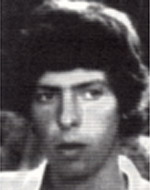Frenkel, Oren
Son of Drorit and Uriel was born on May 23, 1962 in Kibbutz Kabri in the Western Galilee. From childhood, Oren was distinguished by his creative talent. He was tall, friendly to his friends, modest in his ways, and involved in social activities in his kibbutz. Oren had technical talents, and with his own hands and without any help, he built a vehicle for himself that he used for his work on the kibbutz. He studied at the Kabri school and completed his high school studies in a theoretical track. In January 1980 Oren was drafted into the IDF and served in the Armored Corps, where he was outstanding in his special character and leadership skills, and Oren was promoted to the rank of sergeant. On the third day of the war, June 9, 1982, a fierce battle broke out with the Syrian armored corps near Ein A-Tina, and Oren’s tank was hit. And was killed at the age of 20. He was buried at Kibbutz Kabri, where Oren left behind his parents and brother, and the Minister of Defense wrote in a letter of condolence to his family: “Sergeant or Estate Frankel gave his live for his country. He served in the Armored Corps. He was a commander and instructor in the tank commanders course. Quiet, modest, performed his work in the best possible way. Oren was loved by his comrades and commanders. “The commander of his unit wrote to his family:” Oren fought as a tank commander, and thanks to him the goal was achieved. I knew him well, even as a tank commander. Even then he stood out for the perfection of his actions and his high professional standards. I decided with the company staff to leave Oren at the end of the course in the battalion, as a tank commander and as a guide in a tank commanders course. He served under my command for a while. My meetings and conversations with him made me very Simcha. I knew him as a young man, clever, industrious, full of satisfaction as commander and guide. The value of the role and the importance of the act accompanied his actions throughout. He managed to convey these values to his soldiers as well. He belonged to those commanders with natural leadership skills. He never needed orders. His personal example was self-evident. He will continue to be a figure, by which we will educate our soldiers “
